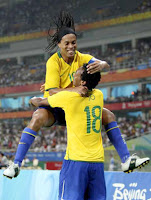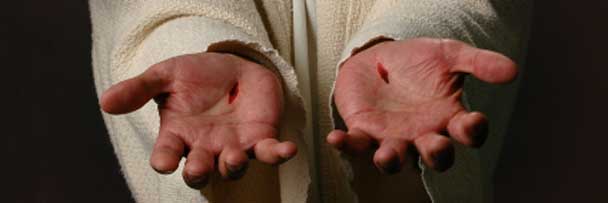Brazil July 2010 (4)
FOOTBALL / SOCCER
Late playwright and journalist Nelson Rodrigues once wrote, “Seleção [the 23-player national squad] is our homeland in soccer boots.” That’s the mood in the eve of a new World Cup, this time in South Africa.
Brazilians are not so optimistic this time as to winning a sixth World Cup this year. Coach Carlos Dunga chose 23 players not as ball artists, but as loyal workers. Beautiful game is not the main concern. So, big-name veterans as Ronaldo, Ronaldinho (left, on top) and Adriano were left behind when the final list was delivered. So were young stars as Neymar and Ganso, both aged under 20, seen as too young.
Dunga (Portuguese for Snow White dwarf Dopey) is famous for his stubbornness and for ill humored press conferences. Some say he looks rather like Grumpy. A former captain in the winning squad of 1994 (the US World Cup), he coaches as he played, not as genius but with tireless, sheer application and effectiveness.
There are some top stars in Brazilian squad. Goalkeeper Julio Cesar is the world’s best, and Kaká was elected best world player two years ago. Robinho is the main representative of stylish, beautiful game in this squad.
The tournament begins in June 11 and lasts one month. All 32 competitors play at least three times in World Cup, within 4-squad group mates. Sixteen squads go on to a second round-of-16 matches. Then, the winners go through quarterfinal and semifinal matches. Here, winners go to the final match and losers play a lame-duck match for third rank.
Match days in Brazil are something close to national holidays. As usual match times are in the afternoon, Government and private offices work halftime, as well as schools.
A wave of patriotism spreads over the country, and national green-yellow flags are all around in the streets, buildings, windows and on TV all the time. The national soccer squad jersey becomes a uniform, in official and low-cost pirate versions.
Quarterfinals are scheduled to happen in July 2 and 3. Brazil is expected to play one of them, as usual. A victory will lead to a nationwide euphoria, and soccer fans (and press columnists) will forget the complaints against Dunga and join the crowd. A failure will lead Brazil to normal life, redirecting attention towards the Presidential race, now somewhat left aside.
Late playwright and journalist Nelson Rodrigues once wrote, “Seleção [the 23-player national squad] is our homeland in soccer boots.” That’s the mood in the eve of a new World Cup, this time in South Africa.
In recent years Brazil has produced stars in Olympic sports as volleyball, swimming and tennis. But soccer remains unbeatable as no.1. Brazil sees himself as The Soccer Country. Each Brazilian is said to be a soccer coach, what totals 180 million in this country.
Brazilians are not so optimistic this time as to winning a sixth World Cup this year. Coach Carlos Dunga chose 23 players not as ball artists, but as loyal workers. Beautiful game is not the main concern. So, big-name veterans as Ronaldo, Ronaldinho (left, on top) and Adriano were left behind when the final list was delivered. So were young stars as Neymar and Ganso, both aged under 20, seen as too young.
Dunga (Portuguese for Snow White dwarf Dopey) is famous for his stubbornness and for ill humored press conferences. Some say he looks rather like Grumpy. A former captain in the winning squad of 1994 (the US World Cup), he coaches as he played, not as genius but with tireless, sheer application and effectiveness.
There are some top stars in Brazilian squad. Goalkeeper Julio Cesar is the world’s best, and Kaká was elected best world player two years ago. Robinho is the main representative of stylish, beautiful game in this squad.
The tournament begins in June 11 and lasts one month. All 32 competitors play at least three times in World Cup, within 4-squad group mates. Sixteen squads go on to a second round-of-16 matches. Then, the winners go through quarterfinal and semifinal matches. Here, winners go to the final match and losers play a lame-duck match for third rank.
Match days in Brazil are something close to national holidays. As usual match times are in the afternoon, Government and private offices work halftime, as well as schools.
A wave of patriotism spreads over the country, and national green-yellow flags are all around in the streets, buildings, windows and on TV all the time. The national soccer squad jersey becomes a uniform, in official and low-cost pirate versions.
Quarterfinals are scheduled to happen in July 2 and 3. Brazil is expected to play one of them, as usual. A victory will lead to a nationwide euphoria, and soccer fans (and press columnists) will forget the complaints against Dunga and join the crowd. A failure will lead Brazil to normal life, redirecting attention towards the Presidential race, now somewhat left aside.



Comentários